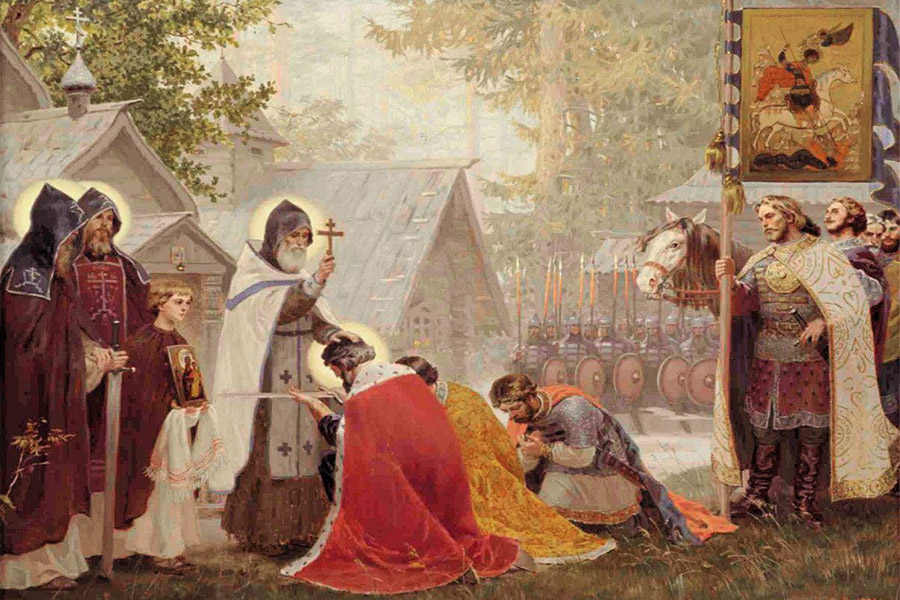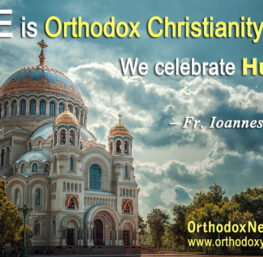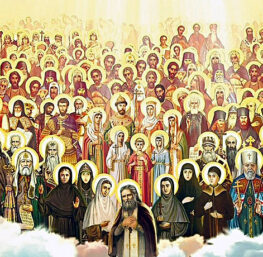 by Fr. Geoffrey Korz –
by Fr. Geoffrey Korz –
A Word to Quietists Who Distort the Practice of the Church
What are politics? By definition, politics are the business of the polis – the business of the city. Wherever the people of the Church are found, wherever the faithful live and assemble, the lives of these members of the Body of Christ should be a concern to their shepherds.
How is this demonstrated in the example of the saints, the holy ones whose lives give us the roadmap for our lives as Orthodox Christians? It is the lives of the saints and elders who guide us on implementing the scriptures in our lives: we do not simply read the Bible and try to explain it on our own – off the top of our heads – nor do we rely on this or that bishop or priest to do so, however clever, popular, educated, or titled he might be (since this is merely celebrity culture).
Partisanship is Different from Politics
By definition, the saints – and especially the clergy – must not become involved in partisanship. Partisanship is different from politics, since partisanship involves joining an identifiable political faction – i.e. a political party – and thereby identifying it with the views of the Church, or the will of God. This applies also to the clergy championing the cause of one nation as a faction against another nation: this is a heresy called phyletism, in which the views of the Church and the will of God are identified with the interests and good of one nation. This is simply another flavor of partisanship, and it denies the universal saving message of the Gospel: that Christ came into the world to save people from all factions, and from all nations.
While the faithful of the Orthodox Church are drawn from different nations, and while they are entitled to be part of different political factions (except those which teach things opposed to the Church), the clergy must exclude themselves from being part of any party or faction, since they must be able to minister to everyone. (Indeed, the canons forbid clergy holding partisan membership, as well as holding any political office).
Apart from partisan membership, what is the example given to us by the saints and elders when it comes to involvement in political affairs? Examples from Holy Tradition point to matters which concern the welfare of the faithful, the freedom of the Church, and the care of those outside the Church.
Apologia to Emperor Hadrian
The Apostle Quadratus of the Seventy (commemorated September 21) wrote an Apologia to Emperor Hadrian, which saved Christians from persecution. This written appeal profoundly moved the Emperor – much like a letter to a public official or a presentation to a government committee might do today. It is noteworthy that this action was taken specifically in defense of the faithful of the Church.
Such obligation on the part of the saints to defend the faithful is seen at other times as well. Saint Herman of Alaska (commemorated December 12th) regularly made appeals to the Russian American Company in defense of Aleut Natives, who were being oppressed and abused by these Russian merchants, who respected neither their brethren and the teachings of the Orthodox faith, nor the dignity of the local Alaskan natives whom they employed in the fur trade. Ultimately, these appeals had to be resolved by higher officials of the Russian Empire. Despite being a monastic and lacking clerical orders, Saint Herman was vigorous and sustained in his vocal objections in defense of his Orthodox Aleut brethren, even to the point of being persecuted, and to the loss of his own propert at the hands of the Russian America Company.
Saint Euphemia
Saint Euphemia (commemorated October 16th) famously said one must obey the Emperor as long as his command is not against God; if his command is against God, not only don’t obey it, but oppose it. Such an exhortation to Christians from a miracle-working saint – who revealed the truth of Orthodoxy to the Church at the Fourth Ecumenical Council – cannot be taken lightly.
How have the faithful historically applied the holy example of the saints in this regard? One example is found from the time of the conflict with the Arian heretics, who battled with the Orthodox for control of Church buildings, and the freedom to publicly assemble for the Liturgy. We read in the Prologue from Ochrid (August 25th):
Emperor Maximian, a fierce and merciless persecutor of Christians, ordered his Antiochian proconsul to release St. Andrew Stratelates from prison, in fear that the people would rebel, since they respected Andrew more than the emperor. Emperor Valens ordered his eparch in Edessa to slay all Christians who opposed Arius. The eparch had more human compassion than the emperor. The Edessan Christians had services in a field outside the city, for the Arians had seized all the churches in the city. The eparch warned the Christians to forego the services in the field the next day, so that they would not be killed.
Contrary to this warning, all the Christians set out happily to the field, rejoicing that they would suffer and die for the true Faith. The eparch, marching out of the city with the soldiers, saw a Christian woman with a child in her arms as she hurried past the soldiers toward the field. The eparch said to her: “Haven’t you heard that the eparch, with his soldiers, will come and kill everyone that he finds there?” The woman answered: “I heard–and because of that, I am hurrying to the field, so that I can die for Christ with the others.”
The eparch continued: “And why are you taking this child with you?” The woman replied: “I want my child to become worthy of martyrdom as well as myself.” At this, the eparch was filled with dread, and returned to the city with his soldiers to inform the emperor. The emperor also was filled with fear, and revoked his order to massacre the Christians.
Saint Babylas
Regarding the authority of the state to enter the churches of the Orthodox, we read in the life of Saint Babylas (Prologue from Ochrid, September 4th) on this important question:
Emperor Numerian concluded a peace treaty with a barbarian king, who was more noble and peace-loving than he. As a sign of his sincere desire for a lasting peace, the barbarian king gave his young son to be brought up and educated in Numerian’s court. One day Numerian stabbed this innocent boy to death with his own hands, and offered him as a sacrifice to the idols. Still hot from the crime and the innocent blood, this criminal with an emperor’s crown went to a Christian church to see what was going on there.
St. Babylas was at prayer with the people, and heard that the emperor had come with his retinue and desired to enter the church. Babylas interrupted the service, went out in front of the church, and told the emperor that as he was an idolater he could not enter the holy temple where the one, true God was glorified. In a homily about Babylas, St. John Chrysostom said: “Who else in the world would he fear–he who, with such authority, repulsed the emperor?… By this, he taught emperors not to overreach their authority beyond the measure given to them by God, and he also showed the clergy how to use their own authority.”
Courage of the Saints
Such is the courage of the saints. Such is their confidence in the consistent and steady example shown by their holy predecessors within Holy Tradition. With great confidence in these great witnesses, clergy and bishops today can draw strength when they are called to protect the holy places, or to defend the faithful when they are threatened by the state or a secular employer on a matter pertaining to their faith.
It is a contradiction to exhort silence from those who defend the faithful, while seeking public approval alongside political elites. Nowhere is this found in the example of the saints, rather, courage, and total faith in the power of Christ to help those who will act – first with prayer, fasting, repentance, and the strength of the Holy Mysteries, but also with reasoned action.
In all cases, each and every faithful Christian runs the risk of losing his or her inner stillness when engaging with issues relating to the state. This is perhaps the greatest risk, since it is a risk to the salvation of our own soul, and it is for this reason that any civic actions must not be undertaken lightly.
Clergy Active Participation in Civic Live Commanded by the Saints
As we can see, while partisanship is forbidden to the clergy, active participation in civic life – by both clergy and laity – for the welfare of the faithful and the preservation of the freedom of the Church is not only permitted, but commanded by the example of the saints. We should mark carefully: in none of these cases do either clergy or laity act only with the blessing of a bishop as some would wrongly argue (in the manner of the Papal church in the West). Instead, this is the normal initiative of a well-formed Orthodox Christian conscience, guided by all the norms of a normal Orthodox Christian life, and the middle path of Holy Tradition.
The caution the Orthodox Christian must exercise in this instance, as in every aspect of life, regards the impact that involvement with civic or political matters has on the soul. The real risks of such activities are not outward, neither physical nor canonical (as we have already outlined), but the risks associated with involving the heart too much with affairs of the world, and sacrificing the inner peace and stillness for which one works so hard in the Christian life.
The fact that so many saints were able to struggle in both the political and the spiritual battles is a testament to God’s grace, and to the guidance of their spiritual fathers, by whose prayers they were each saved from the many stumbling blocks of worldly life. This calling, with all its spiritual risks, remains the example of countless saints, and is commanded by their words and their lives. To suggest otherwise would be a distortion of the truth.
—————————————————
HT: Pravmir. (Bolded headers added and some content organizational revisions made by blog editors to improve readability.)





Politics is nothing more than private views held in the public domain. It is faith, beliefs, and values in action. Therefore religion and politics are not mutually exclusive as the churches would have you believe as they use Romans 13 to justify their cowardly approach to issues in the public square. Even Martin Luther King, Jr. knew that if a law was immoral, Christians were not bound to obey it.
So, “riddle me this Batman.” How can an Orthodox Christian, or any Christian, for that matter, align himself with a political party that thinks it is all right to kill “the least of these?” How can a Christian align himself with a political party that thinks it is all right to change genders, to self-mutilate, and by doing so tell The Most High that He made a mistake in human design? And why are Orthodox clergy overall staying mum on these issues?